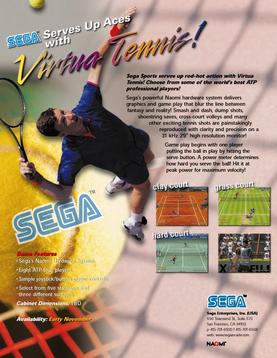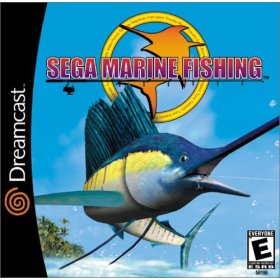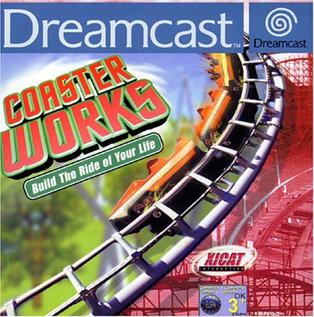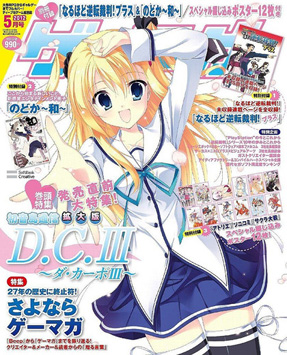
The Dreamcast is the final home video game console manufactured by Sega. It was released on November 27, 1998, in Japan; September 9, 1999, in North America; and October 14, 1999, in Europe. It was the first sixth-generation video game console, preceding Sony's PlayStation 2, Nintendo's GameCube, and Microsoft's Xbox. The Dreamcast's 2001 discontinuation ended Sega's 18 years in the console market.

ChuChu Rocket! is an action puzzle game developed by Sonic Team and published by Sega. Released for the Dreamcast in 1999, it was the first game for the system to support online console gaming. Players must place arrows on a board to lead mice into escape rockets while avoiding cats. The game features single-player modes in which a player must save all the mice on a board, and a multiplayer mode in which players battle to collect the most mice.

Virtua Tennis, known in Japan as Power Smash, is a 1999 tennis arcade game created by Sega. The player competes through tennis tournaments in an arcade mode. It was ported to the Dreamcast in 2000, and to Windows in 2002. A Game Boy Advance version was also released in 2002, followed by an N-Gage version in 2003. For the home console market, the game was expanded with the introduction of the campaign mode.

Death Crimson OX is a light gun shooting game developed by Ecole Software. It was released in arcades in 2000 then ported to the Dreamcast console in 2001, several months after Sega had dropped support for the console. It is the third and final game in the Death Crimson series, and the only one to be released outside Japan. The game was also released as Guncom 2 in Europe and Death Crimson OX+ in Japan on the PlayStation 2.

Sega Rally 2 is an arcade racing game developed by Sega for the Model 3 arcade hardware. It is the sequel to 1994's Sega Rally Championship. The game was first released in arcades in February 1998, and was later ported to the Sega Dreamcast, becoming one of the console's earliest titles when it was released in Japan on January 28, 1999. The Sega Dreamcast version was released in Europe as a launch title on October 14, 1999, and then in North America on November 27. A PC version was released in Japan and Europe that same year, with the North American release following suit in September 2000, where it was published by Mattel Interactive.

Gunbird 2 is a 2D scrolling shooter developed by Psikyo and published by Capcom as a sequel to the original Gunbird. It was originally released in Japanese arcades in 1998, and was later ported to the Dreamcast in 2000 and released worldwide. An Android version was released in Korea in 2014, before it came out worldwide on both Android and iOS in 2016. The arcade game was also included in Gunbird Special Edition for the PlayStation 2. A version was released on Nintendo Switch in June 2018, Microsoft Windows in June 2020, and PlayStation 4 and Xbox One in August 2022.

The Dreamcast is a home video game console by Sega, the first one introduced in the sixth generation of video game consoles. With the release of the Dreamcast in 1998 amid the dot-com bubble and mounting losses from the development and introduction of its new home console, Sega made a major gamble in attempting to take advantage of the growing public interest in the Internet by including online capabilities in the console as a selling point. As such, the Dreamcast was the first console to include a built-in modem for Internet support and online play. Sega would end up leaning heavily into the online capabilities to sell the Dreamcast as hype grew for Sony's then-upcoming competitor, the PlayStation 2, which also promised online gaming in addition to its DVD capabilities.

Sega Marine Fishing is a fishing video game published by Sega for arcade games, Dreamcast and Microsoft Windows in 1999-2002.

Hydro Thunder is an arcade inshore powerboat racing video game originally released by Midway Games in February 1999 and later released for the Sega Dreamcast as a launch title later that year. It was also released for the PlayStation and Nintendo 64 in early 2000. This game is part of Midway's Thunder series of racing games, which includes Offroad Thunder, 4 Wheel Thunder, and Arctic Thunder. Hydro Thunder Hurricane, a sequel to Hydro Thunder, was later released for the Xbox 360 on July 27, 2010 on Xbox Live Arcade.

SIMS Co., Ltd., which stands for "Soft Development Innovation Multi Success", is a Japanese video game publisher and developer originally established on June 12, 1991 as a joint venture of Sanritsu Denki Co., Ltd. and Sega Enterprises, Ltd. About 50 employees transferred over from Sanritsu.

Coaster Works, known in Japan as Jet Coaster Dream, is a simulation game for the Dreamcast console published by Bimboosoft. The game is a simulation of roller coaster design and construction. Each of the levels offer certain requirements that the player must meet to pass to the next level. The game starts the player off in a "kiddie" themed park and progresses to more and more difficult levels with more difficult requirements. A direct sequel titled Jet Coaster Dream 2 was released on November 2, 2000 in Japan only as the North American and PAL releases were cancelled for 2001. A third game titled Rollercoaster World was developed by Takara and published by D3 Publisher in Japan as Simple 2000 Series Vol. 33: The Jet Coaster on July 24, 2003, and by Midas Interactive Entertainment in Europe on May 21, 2004 for the PlayStation 2.

Itoi Shigesato no Bass Tsuri No. 1 is a fishing video game developed and released only in Japan for the Super Famicom on February 21, 1997 and updated for broadcast as eight different episodes on the Satellaview subsystem between April and November 1997. On March 31, 2000, the latest version of the game was released for the Nintendo 64 as the Definitive Edition. The game allows the player to play as the creator of the game, Shigesato Itoi, and includes a host of animal characters who occasionally appear in the game. The SA-1 was used in the Super Famicom version.

Sega Bass Fishing, known in Japan as Get Bass, is an arcade fishing video game developed in 1997 by Sega for the Sega Model 3 hardware. The game has since been ported to the Dreamcast, Microsoft Windows, Xbox 360, PlayStation 3 and Wii.

Spawn: In the Demon's Hand is a 3D fighting game developed and published by Capcom for the Dreamcast and arcade. It is based on the comic book character Spawn created by Todd McFarlane and produced by Image Comics. A port was planned for the PlayStation 2 as a launch title but was later canceled.
Sega All Stars was Sega's budget series for the Dreamcast in North America. It included a total of 17 titles, each retailing for $19.95 in the United States and $29.95 in Canada. Seven of these were first released as Dreamcast launch titles. Sega All Stars titles are typically rated "E for Everyone" by the ESRB, and typically have a sports theme, but there are a few exceptions.

Hooked! Real Motion Fishing is a fishing video game for the Wii video game console, released on October 30, 2007. The game supports Nintendo Wi-Fi Connection and comes with a free fishing rod attachment with the game's purchase. Hooked! Real Motion Fishing is the localized version of Bass Fishing Wii: Rokumaru Densetsu in Japan. In Europe, the game is called Big Catch Bass Fishing, which is also the name given to an otherwise unrelated Nintendo DS fishing game developed by Starfish-SD.

Reel Fishing is a series of fishing video games by Natsume Inc. The first game, Reel Fishing, was released for the PlayStation in 1996. Originally a localization of Victor Interactive Software's Fish Eyes series from Japan, Natsume Inc. has since diverged from that series to create their own games.

Reel Fishing: Wild, known in Japan as Fish Eyes: Wild, is a video game developed by Westone Bit Entertainment and published by Victor Interactive Software and Natsume Inc. for Dreamcast in 2001.

Sega Bass Fishing 2, known in Japan as Get Bass 2, is a video game developed by WOW Entertainment and published by Sega for the Dreamcast in 2001. It is the sequel to Sega Bass Fishing.

Gemaga was a Japanese video game magazine founded in 1984 as Beep and published by SB Creative. During its history, it was known variously as Beep, Beep! MegaDrive, Sega Saturn Magazine, Dreamcast Magazine, Dorimaga, and finally Gemaga. When it ended publication in May 2012, it was the longest-running Japanese game magazine.

















